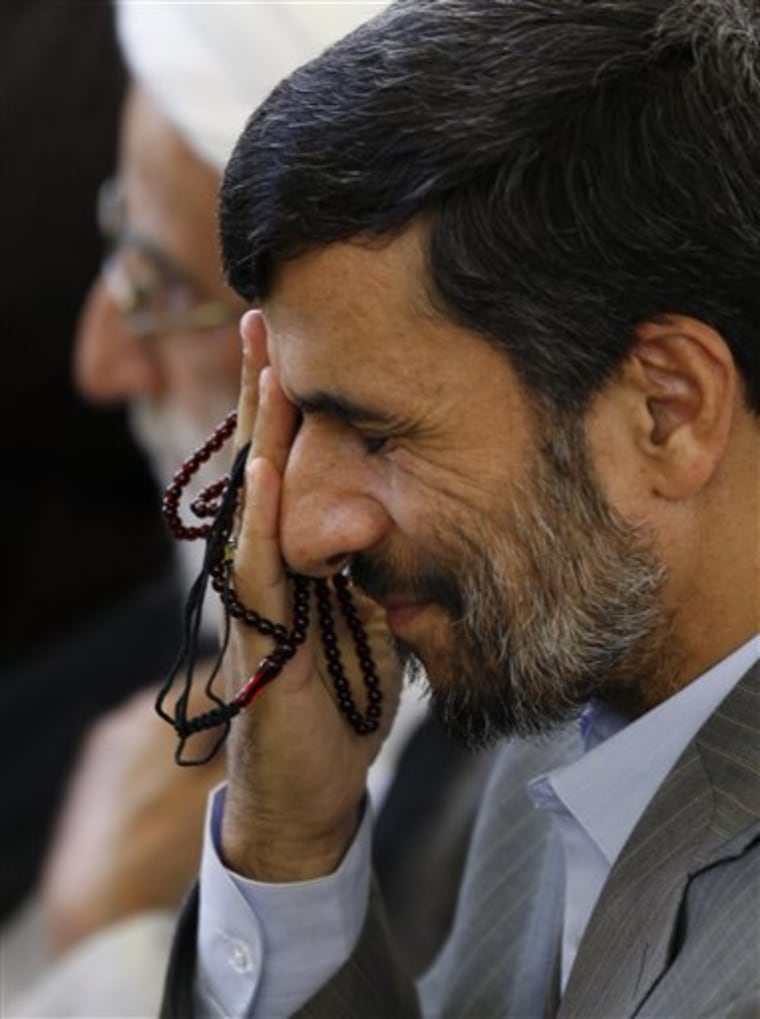Iran is stonewalling the U.N. nuclear watchdog agency about "possible military dimensions" to its suspect nuclear program, officials said Friday, urging the regime to clarify the mysterious role of a foreign explosives expert and shed light on other issues.
A senior Iranian envoy angrily denounced the assessment as "fabrication," insisting his country has gone out of its way to be transparent and cooperative.
In its latest report, the International Atomic Energy Agency said it has pressed the Islamic Republic to clarify its uranium enrichment activities and reassure the world that it isn't trying to build an atomic weapon.
Iran insists its nuclear program is peaceful and geared solely toward generating electricity. The United States and key allies contend the country is covertly trying to build an atomic weapon.
Ahead of Sept. 2 six-power talks on Iran — and a key meeting of the IAEA's 35-nation board a week after that — the IAEA acknowledged that Tehran has been producing nuclear fuel at a slower rate and has allowed U.N. inspectors broader access to its main nuclear complex in the southern city of Natanz.
But the Vienna-based agency delivered a blunt assessment: "Iran has not suspended its enrichment-related activities."
"There remain a number of outstanding issues which give rise to concerns and which need to be clarified to exclude the existence of possible military dimensions to Iran's nuclear program," said the text, a copy of which was obtained by The Associated Press.
It said the IAEA "does not consider that Iran has adequately addressed the substance of the issues, having focused instead on the style and form ... and providing limited answers and simple denials."
Iran: Report 'very frustrating'
Iran's chief representative to the IAEA, Ali Asghar Soltanieh, told the AP he found the report "very frustrating," and angrily suggested that U.S. intelligence was working to undermine Tehran's credibility.
"America alleges that Iran has a Manhattan Project" to build a bomb, Soltanieh said. "This is ridiculous. This game is enough. It should be over ... We have tried to take a very logical and pragmatic approach."
"All these things are fabrications. We have been too transparent and cooperative with the agency," he added.
The report raised the specter of harsher international sanctions against Iran for not answering lingering questions about its nuclear activities.
U.S., allies warning Iran
President Barack Obama has given Tehran something of an ultimatum: Stop enriching uranium, which — if done at a high level — can produce fissile material for the core of a nuclear weapon — or face harsher penalties. In exchange, it could get trade benefits from the six countries engaged in the talks: the United States, Britain, China, France, Germany and Russia.
This week, German Chancellor Angela Merkel warned Iran that if it doesn't respond, it could face stronger sanctions in the energy and financial sectors.
French President Nicolas Sarkozy, meanwhile, suggested unspecified "severe" new sanctions against Iran if it continues its nuclear activities.
Despite the pressure, senior U.N. officials said Friday that Iran has been feeding uranium ore into its 8,300 centrifuges at a reduced rate, suggesting that sanctions already in place may be hampering its program.
"We need further explanations," said a Western diplomat, declining to be identified because he was not authorized to publicly discuss the confidential report.
The U.N. Security Council has imposed sanctions against Iran three times since 2006 for its refusal to freeze uranium enrichment. The sanctions grew from fears that Iran is using the pretext of building a peaceful nuclear energy program as a guise to eventually make weapons-grade enriched uranium.
The country has also been placed on an international watch list to help limit the importation of nuclear materials, which could make it difficult to procure enough uranium oxide to feed its enrichment program.
The IAEA also chided Syria for not fully cooperating on efforts to clear up questions about whether it was trying to build a nuclear complex at a desert site bombed by Israel in 2007.
